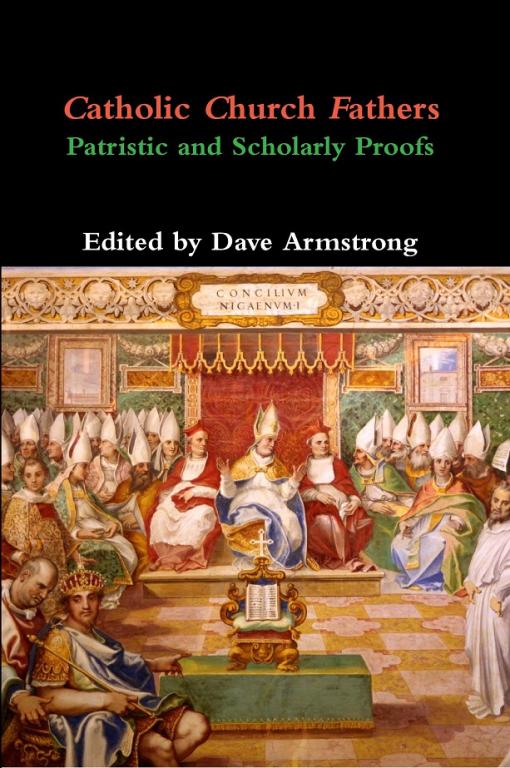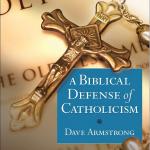
(Book and purchase information)
***
Ken Temple is an anti-Catholic polemicist, whom I have debated many times in the past. He knows full well that I don’t waste my time wrangling with anti-Catholic zealots in debates about theology. This has been my policy since 2007, with very few exceptions (for special reasons; in fact, the very paper he critiqued was one such exception). This reply is not arguing theology. It’s merely setting certain facts straight about what I have defended and argued about as regards St. Irenaeus; facts that Ken Temple seems to be blissfully unaware of.
His latest blast against me is “Dave Armstrong: Taking Irenaeus out of Context” (10-25-17). He quotes an Irenaeus citation of mine (his words will be in blue below):
“And then shall every word also seem consistent to him, if he for his part diligently read the Scriptures in company with those who are presbyters in the Church, among whom is the apostolic doctrine, as I have pointed out.”
(Against Heresies, IV, 32, 1) [only the last sentence]
He provides a defunct URL of a paper of mine, from Blogspot, which I left in August 2015 (my blog is now hosted on Patheos). But I did manage to locate the currently archived version of the paper, listed on my current blog. I cited St. Irenaeus many times in this paper, often at some length. I cited Protestant historians Philip Schaff and J. N. D. Kelly talking about St. Irenaeus’ rule of faith (which is quite Catholic and not even remotely approaching anything resembling Protestantism).
But all we get is one selected citation of Irenaeus, which Ken claims is taken out of context. He proceeds to provide more context, where Irenaeus talks a lot about Scripture. I didn’t cite it because that wasn’t at issue: both Catholics and Protestants agree that Scripture is inspired, God-breathed revelation, and that’s mainly what he is talking about (e.g., “one God was the author of both Testaments”). Since there is no disagreement whatever on that score, that portion is irrelevant to the usual Catholic-Protestant debates on the rule of faith. And that’s why I didn’t cite it in that context.
Ken falls into the same old same old fallacies of Protestants defending sola Scriptura, that I’ve seen a hundred times. I described it in the introductory portion of a huge debate on sola Scriptura that I engaged in with the referenced fellow anti-Catholic apologist, Ken’s buddy, Jason Engwer, on 8-1-03. In the first portion of that debate, I wrote:
Entire books are written about the Fathers’ supposed belief in sola Scriptura, when in fact they are merely expressing their belief in material sufficiency of Scripture, and its inspiration and sufficiency to refute heretics and false doctrine generally. It is easy to misleadingly present them as sola Scripturists if their statements elsewhere about apostolic Tradition or succession and the binding authority of the Church (especially in council) are ignored. But a half-truth is almost as bad as an untruth (arguably worse, because in most instances the one committing it should know better).
True to form, Ken completely ignores that. He blows off the relevant portion (i.e., to Catholic-Protestant debate) of the long quote he gives from Irenaeus: that refers to apostolic tradition and the Church’s guidance, and pretends as if all Irenaeus is talking about is Scripture Alone. This won’t do. It’s a “half-truth” as I noted (almost as bad as a lie). All Ken can see is Scripture Scripture Scripture, while ignoring the Church father’s express statement that Christians ought to “diligently read the Scriptures in company with those who are presbyters in the Church, among whom is the apostolic doctrine.” He thinks that because I didn’t also cite the long praises of Scripture, that somehow this utterance loses its force and obvious meaning, and is reputedly “out of context.” It’s not.
Ken writes:
Every time Irenaeus spells out the content of the “rule of faith”, it is a doctrinal summary in simple form of the main doctrines of the ecumenical creeds of the first 5 centuries. (see Against Heresies, 1:10:1-2 and 3:4:2) Protestants agree with this.
I looked up the linked Against Heresies 1:10:1-2 and again and again it teaches things that are consistent with Catholic (and very unProtestant) notions of tradition (highlighted in purple below), apostolic succession (highlighted in green), and a refutation of faith alone (in red):
1. The Church, though dispersed through our the whole world, even to the ends of the earth, has received from the apostles and their disciples this faith: [She believes] in one God, the Father Almighty, Maker of heaven, and earth, and the sea, and all things that are in them; and in one Christ Jesus, the Son of God, who became incarnate for our salvation; and in the Holy Spirit, who proclaimed through the prophets the dispensations of God, and the advents, and the birth from a virgin, and the passion, and the resurrection from the dead, and the ascension into heaven in the flesh of the beloved Christ Jesus, our Lord, and His [future] manifestation from heaven in the glory of the Father “to gather all things in one,” and to raise up anew all flesh of the whole human race, in order that to Christ Jesus, our Lord, and God, and Saviour, and King, according to the will of the invisible Father, “every knee should bow, of things in heaven, and things in earth, and things under the earth, and that every tongue should confess” to Him, and that He should execute just judgment towards all; that He may send “spiritual wickednesses,” and the angels who transgressed and became apostates, together with the ungodly, and unrighteous, and wicked, and profane among men, into everlasting fire; but may, in the exercise of His grace, confer immortality on the righteous, and holy, and those who have kept His commandments, and have persevered in His love, some from the beginning [of their Christian course], and others from [the date of] their repentance, and may surround them with everlasting glory.
2. As I have already observed, the Church, having received this preaching and this faith, although scattered throughout the whole world, yet, as if occupying but one house, carefully preserves it. She also believes these points [of doctrine] just as if she had but one soul, and one and the same heart, and she proclaims them, and teaches them, and hands them down, with perfect harmony, as if she possessed only one mouth. For, although the languages of the world are dissimilar, yet the import of the tradition is one and the same. For the Churches which have been planted in Germany do not believe or hand down anything different, nor do those in Spain, nor those in Gaul, nor those in the East, nor those in Egypt, nor those in Libya, nor those which have been established in the central regions of the world. But as the sun, that creature of God, is one and the same throughout the whole world, so also the preaching of the truth shineth everywhere, and enlightens all men that are willing to come to a knowledge of the truth. Nor will any one of the rulers in the Churches, however highly gifted he may be in point of eloquence, teach doctrines different from these (for no one is greater than the Master); nor, on the other hand, will he who is deficient in power of expression inflict injury on the tradition. For the faith being ever one and the same, neither does one who is able at great length to discourse regarding it, make any addition to it, nor does one, who can say but little diminish it.
Yes; Irenaeus provides a Nicene Creed-like summary of the Catholic faith; just as Catholics and many Protestants cite every Sunday. It doesn’t follow, however, that both Catholics and Protestants don’t also believe many things that are not mentioned in the Nicene Creed: like original sin or TULIP (Calvinists) or absolute assurance of instant salvation, or purgatory, or Mary. And the Nicene Creed includes baptismal regeneration: a biblical and historic Christian doctrine that many Protestants including Ken, reject. We see the same in 3:4:2. I shall also cite 3:4:1 (references to oral tradition in brown):
1. Since therefore we have such proofs, it is not necessary to seek the truth among others which it is easy to obtain from the Church; since the apostles, like a rich man [depositing his money] in a bank, lodged in her hands most copiously all things pertaining to the truth: so that every man, whosoever will, can draw from her the water of life. For she is the entrance to life; all others are thieves and robbers. On this account are we bound to avoid them, but to make choice of the thing pertaining to the Church with the utmost diligence, and to lay hold of the tradition of the truth. For how stands the case? Suppose there arise a dispute relative to some important question among us, should we not have recourse to the most ancient Churches with which the apostles held constant intercourse, and learn from them what is certain and clear in regard to the present question? For how should it be if the apostles themselves had not left us writings? Would it not be necessary, [in that case,] to follow the course of the tradition which they handed down to those to whom they did commit the Churches?
2. To which course many nations of those barbarians who believe in Christ do assent, having salvation written in their hearts by the Spirit, without paper or ink, and, carefully preserving the ancient tradition, believing in one God, the Creator of heaven and earth, and all things therein, by means of Christ Jesus, the Son of God; who, because of His surpassing love towards His creation, condescended to be born of the virgin, He Himself uniting man through Himself to God, and having suffered under Pontius Pilate, and rising again, and having been received up in splendour, shall come in glory, the Saviour of those who are saved, and the Judge of those who are judged, and sending into eternal fire those who transform the truth, and despise His Father and His advent. Those who, in the absence of written documents, have believed this faith, are barbarians, so far as regards our language; but as regards doctrine, manner, and tenor of life, they are, because of faith, very wise indeed; and they do please God, ordering their conversation in all righteousness, chastity, and wisdom. If any one were to preach to these men the inventions of the heretics, speaking to them in their own language, they would at once stop their ears, and flee as far off as possible, not enduring even to listen to the blasphemous address. Thus, by means of that ancient tradition of the apostles, they do not suffer their mind to conceive anything of the [doctrines suggested by the] portentous language of these teachers, among whom neither Church nor doctrine has ever been established.
Section 3 is precisely a refutation of the heretics by virtue of (not the Bible but) apostolic succession: the notion that the Catholics could trace their doctrines back in unbroken succession to the apostles, whereas the heretics could not, and were traced back to one man, some time after the apostolic age. Hence Irenaeus concludes by saying, “each one of them appeared to be both the father and the high priest of that doctrine into which he has been initiated. But all these (the Marcosians) broke out into their apostasy much later, even during the intermediate period of the Church.”
The title of the section (I’m not sure if it is from Irenaeus or the editors) confirms what I am contending: “The truth is to be found nowhere else but in the Catholic Church, the sole depository of apostolical doctrine. Heresies are of recent formation, and cannot trace their origin up to the apostles.” This is apostolic succession: a doctrine that is rejected by Protestantism, is inconsistent with sola Scriptura, and is accepted by Catholicism and Orthodoxy and Anglicanism (and to some extent by the Methodists who derived from Anglicanism). Thus, at every turn, we see Irenaeus either expressing things that all Christians hold in common, or things that Catholics and Orthodox (and only a few Protestants, not including Ken and almost all of his anti-Catholic buddies) believe. What he doesn’t do is express Protestant distinctives.
Readers might also have noted that both of these writings of St. Irenaeus never mentioned the word or notion of Scripture (though the first one cites Bible passages — without identifying them — several times), while tradition and apostolic succession and the implied binding authority of the Church are mentioned repeatedly. This is scarcely any argument for Protestantism over against Catholicism. The two statements never contradict the latter, while they frequently contradict the former.
But Irenaeus also says that the Presbyters follow the Scriptures as their final authority, because the apostles doctrine was written down, and he just quotes from the writings to prove his point.
He does not say that Scripture is the only binding (“final”) authority; rather, he teaches precisely what we do: the “three-legged stool” of Bible-Church-Tradition [the latter passed down in apostolic succession] as the rule of faith. Ken merely reads his bias into the words. Irenaeus even (as a bonus) takes a “swipe” at the false doctrine of faith alone (sola fide: words in red above). Ken should be embarrassed to pretend that these citations support his contentions. The fact that he doesn’t know that they don’t, and is out to sea, is very telling.
What Ken also doesn’t notice (or chooses to ignore) is the fact that Irenaeus goes so far as to argue that had writing not been available, Christians still would possess the apostolic deposit:
For how should it be if the apostles themselves had not left us writings? Would it not be necessary, [in that case,] to follow the course of the tradition which they handed down to those to whom they did commit the Churches? (3:4:1)
Oh, I forgot. Ken didn’t cite this portion. It was right before what he did cite. Thus, the accusation of quoting out of context would seem to apply far more to him than to myself.
I hope Jason Engwer keeps it up and stays in the battle and responds fully to all of the significant issues . . .
Yeah, that was my hope, too, back in 2003, when we engaged in a much-advertised debate on sola Scriptura and the Church fathers at the large and popular anti-Catholic CARM discussion forum. I was defending Catholic views about four of the ten Church fathers I addressed, based on earlier writings of his. Jason decided to split at that point. He left the debate right in the middle (which I’ve had happen also with James White and another contra-Catholic polemicist). But that’s what anti-Catholics usually do when Catholics come up with things they have no answer for. I’ve observed that over and over now for 27 years.
I proved in 2010 that Jason Engwer ignored an average of 80% of opponents’ arguments, whom he claimed to be refuting (including fellow apologist Bryan Cross). I documented this by showing exactly what he cited from my writing, and how small of a percentage it was of the whole (the rest of which he ignored). This is hardly impressive in a would-be “debater.”
Ken complains at the end of the paper how I haven’t responded to this and that, that some anti-Catholic has written. He knows my policy of no debate on theology with anti-Catholics. I have informed him of it many times. As for St. Irenaeus and his rule of faith, I have dealt with that at least four times now:
Irenaeus (d. c. 200) vs. Sola Scriptura (vs. Jason Engwer) [8-1-03]
Chrysostom & Irenaeus: Sola Scripturists? (vs. David T. King) [4-20-07]
Critique of Martin Chemnitz’ Examination of Trent: The Rule of Faith According to St. Irenaeus and Tertullian [8-29-07] (currently on Internet Archive)
Antidote to William Whitaker’s Sola Scriptura Arguments: Church Councils, St. Irenaeus’ Rule of Faith, and St. John Chrysostom on St. Peter and His Successors [9-26-11] (currently on Internet Archive)
All of these efforts were in response to anti-Catholic counter-claims: two historic Protestant apologists / theologians (Chemnitz and Whitaker) and two apologists from our present day (Jason Engwer and David T. King).
***













